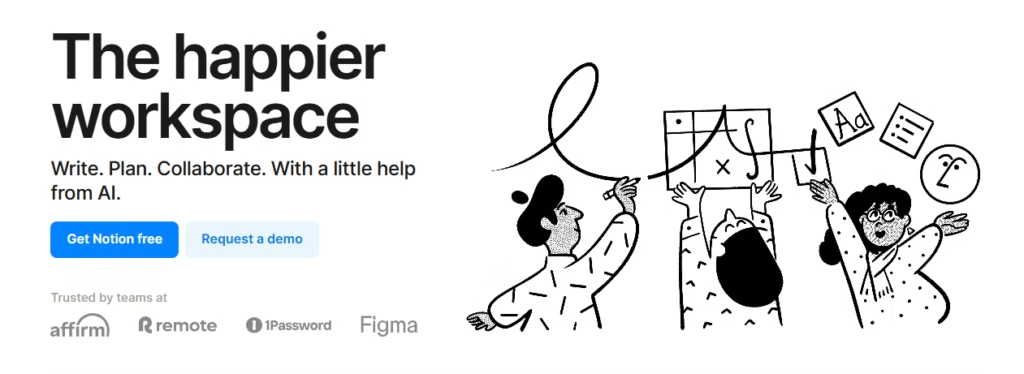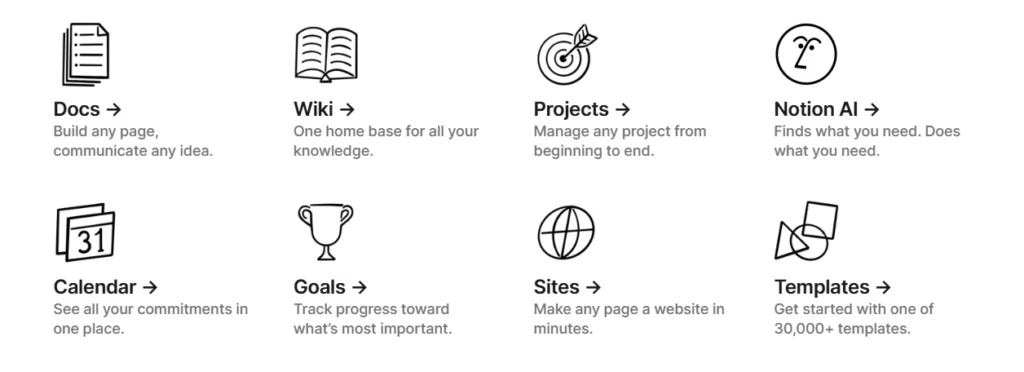In today’s fast-paced, digital-first world, staying organized and productive is more challenging than ever. Enter Notion (accessible at Notion.so), a powerful all-in-one workspace that seamlessly combines note-taking, project management, task tracking, database creation, and team collaboration.

With its versatility, user-friendly interface, and customization options, Notion has become a favorite tool for individuals, teams, and businesses. This article delves deep into what Notion offers, how it stands out in the crowded productivity tools market, and how to leverage it to enhance your workflows.
What is Notion?
The notion is more than just a note-taking app or project management tool—it’s an adaptable platform that allows users to build customized workspaces tailored to their needs.
Whether you’re an entrepreneur managing a startup, a student organizing coursework, or part of a team coordinating projects, Notion provides the tools to streamline processes and consolidate multiple tools into one.
Key features include:
- Notes and Documents: Create rich-text documents with multimedia embedding options.
- Databases: Manage data in various formats, including tables, boards, calendars, and timelines.
- Templates: Access pre-designed templates for common tasks such as meeting notes, content calendars, and personal goals.
- Collaboration: Share workspaces, comment on tasks, and collaborate in real-time with team members.
- Integration: Connect Notion with tools like Slack, Google Drive, and Zapier for a seamless workflow.
Products Offered by Notion
Notion offers a wide range of products to cater to diverse needs. Below is an overview of each product:

1. Notion AI
Notion AI is an integrated assistant designed to enhance productivity. It assists users in drafting, editing, summarizing, and generating content within their workspace. It also helps search and extract information from documents, saving time and effort.
2. Docs
Notion’s Docs feature enables the creation of rich-text documents that support multimedia embedding. It is perfect for drafting, team collaboration, and record maintenance, with seamless sharing and editing capabilities.
3. Wikis
The Wikis feature allows teams to centralize their knowledge base, making information easily accessible and searchable. It’s beneficial for onboarding, maintaining organizational knowledge, and creating a shared resource hub.
4. Projects
Notion’s Projects tool offers powerful project management capabilities. Teams can manage tasks, track progress, and use custom views such as calendars, kanban boards, and Gantt charts to stay on top of their workflows.
5. Calendar
The Calendar feature integrates seamlessly with other tools, allowing users to schedule events, set reminders, and track deadlines effectively. It is ideal for time-sensitive projects and personal organization.
6. Mail (Coming Soon)
Notion has announced its Mail app, slated for release in early 2025. This highly customizable email platform will integrate into Notion, enabling users to manage their inboxes efficiently within the same workspace. (The Verge)
7. Sites
The Sites feature allows users to publish Notion pages as fully functional websites. Whether creating a personal blog, a documentation portal, or a landing page, Sites eliminates the need for external hosting services.
8. Forms
Notion Forms enable users to gather input, responses and requests directly. Integrated seamlessly with Notion databases, Forms make data collection and organization effortless.
9. Marketplace
The Marketplace offers an array of templates crafted for diverse needs. Users can find pre-built solutions for everything from personal organization to complex team workflows.
10. Integrations
Notion supports robust integrations with third-party tools, such as Google Workspace, Slack, and Zapier. These integrations allow users to create streamlined workflows and bridge gaps between systems.
Key Features Explained
1. Flexible Note-Taking and Documentation
Unlike traditional word processors, Notion’s note-taking capabilities are dynamic and interactive. Users can:
- Embed videos, images, and links.
- Organize notes hierarchically using nested pages.
- Use markdown shortcuts for fast formatting.
2. Powerful Databases
Notion’s database functionality sets it apart from competitors like Evernote and Google Docs. Databases can be customized to track:
- Tasks and projects.
- Customer relationship management (CRM).
- Event planning and scheduling.
View options such as grids, kanban boards, calendars, and timelines cater to different workflows.
3. Customization with Templates
Notion offers an extensive library of templates for personal and professional use. From habit trackers to agile project management dashboards, templates save time and help users get started quickly. Notable template categories include:
- Personal productivity: Journals, budgets, and reading lists.
- Team collaboration: Roadmaps, sprint retrospectives, and knowledge bases.
4. Collaboration Tools
Remote and hybrid teams benefit greatly from Notion’s collaboration features. Teams can:
- Assign tasks to members.
- Leave comments with @mentions for context.
- Use shared workspaces to centralize documents and discussions.
5. Seamless Integrations
Notion connects with popular third-party applications, enhancing its utility in diverse ecosystems. Integration examples:
- Slack: Stay updated on workspace changes.
- Google Drive: Embed documents and spreadsheets directly into Notion pages.
- Zapier: Automate repetitive tasks.
Notion Pricing Table
| Plan | Features | Cost |
| Free | Basic features for individuals, including unlimited pages and blocks, and collaboration for up to 10 guests. | $0/month |
| Personal Pro | Advanced tools for personal use, unlimited file uploads, and version history. | $8/month (billed annually) |
| Team | Shared workspace with team collaboration tools, admin controls, and unlimited team members. | $15/month per user (billed annually) |
| Enterprise | Customizable solutions with advanced security, admin tools, and dedicated support. | Custom pricing |
How to Get Started with Notion
Step 1: Create an Account
Visit Notion’s official website to sign up for a free account. Use your email address or sign up via Google.
Step 2: Explore the Interface
Familiarize yourself with the layout, including:
- Sidebar: Houses all your pages and databases.
- Main Workspace: Where you create and manage content.
Step 3: Use Templates
Leverage Notion’s pre-built templates to kickstart your workflow. Popular templates include:
- Weekly agendas.
- Content calendars.
- Budget trackers.
Step 4: Customize Your Workspace
Notion thrives on customization. Experiment with features like:
- Embedding media.
- Creating nested pages.
- Setting up relational databases.
Step 5: Invite Collaborators
For team projects, invite members to your workspace by sharing links or granting access through email.
Advanced Tips for Maximizing Productivity with Notion
1. Master Shortcuts
Keyboard shortcuts in Notion can significantly speed up your workflow. For instance:
- “/table” creates a database table.
- “/todo” inserts a to-do list.
2. Leverage Relational Databases
Link databases to one another for complex workflows. For example:
- Connect a “Tasks” database with a “Projects” database to visualize which tasks belong to which project.
3. Automate Repetitive Tasks
Use Notion’s integration with Zapier to:
- Automatically add tasks from emails.
- Sync calendar events with databases.
4. Explore Community Templates
Websites like Reddit’s Notion Community and Notion Template Gallery offer user-generated templates for specialized use cases.
Use Cases for Individuals and Teams
For Students
A notion can organize academic life with features like:
- Lecture note templates.
- Exam preparation schedules.
- Assignment tracking databases.
For Freelancers
Freelancers can use Notion to:
- Manage client projects.
- Track invoices and payments.
- Create professional portfolios.
For Teams
The notion is invaluable for team collaboration, enabling:
- Centralized document sharing.
- Sprint planning and task delegation.
- Knowledge base creation for onboarding.
Challenges and Limitations of Notion
While Notion is a robust tool, it’s not without its drawbacks:
- Learning Curve: New users may find the plethora of features overwhelming.
- Offline Access: Limited offline capabilities can hinder productivity during internet outages.
- Performance Issues: Large workspaces with heavy data can occasionally lead to slower load times.
Notion’s Roadmap and Future Developments
Notion continues to innovate, with recent updates focusing on:
- Improved AI-powered tools for content generation.
- Enhanced integration options with enterprise software.
- More advanced templates and database features.
Stay updated on new developments through Notion’s blog.
Conclusion
Notion’s all-in-one approach to productivity and collaboration makes it a standout tool in an increasingly crowded market. By combining flexibility, scalability, and ease of use, Notion empowers users to take control of their workflows and achieve more with less effort. Whether you’re an individual seeking personal productivity solutions or a team looking for a collaborative workspace, Notion has something for everyone. To experience its capabilities firsthand.
Related Article: Veo 2 By DeepMind


1 thought on “Notion: The All-in-One Workspace for Productivity and Collaboration”
Comments are closed.